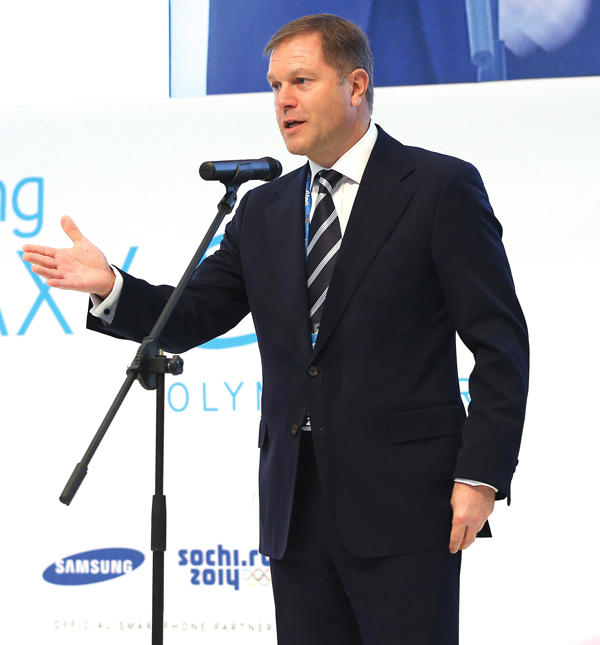The Olympics are facing serious challenges, but the Games’ top salesman believes interest from global corporations in sponsorship deals is at an all-time high.
Timo Lumme, managing director of television and marketing services for the International Olympic Committee, said the world’s economy has created more companies with global marketing ambitions than ever thought possible a generation ago — putting the few truly global sports properties in a strong if demanding position.
“There’s certainly new companies and new sectors coming on stream, as we say, all the time,” Lumme said. “And there’s also globalization, which means these companies don’t come from markets they might have 30 years ago, or even 20 or 15 years ago.”
 |
Companies’ ambitions remain global, IOC's Timo Lumme says.
GETTY IMAGES |
In the four-year Olympic cycle that just ended, IOC sponsorship revenue grew 5.6 percent, eclipsing $1 billion for the first time. The pressure will remain on Lumme to keep growing The Olympic Partner (TOP) program as television broadcast rights revenue plateaus, and most observers expect the current cycle that ends in 2020 to post another big number in light of a 2013 pricing increase. He has said the $2 billion threshold is possible by 2024.
“It certainly must be the most fascinating time to be involved now, and the most fast-moving, and in some ways the most complex as well,” Lumme said. “The point is that the level of interaction and interest in the marketplace is certainly at a high and driven by these kind of global marketing and business trends.”
In a world with exploding opportunities, Lumme said, the program is not bound by any particular number of sponsors or categories.
The high-demand situation is a far cry from the early days of the IOC global sponsorship sales in the 1980s, said Rob Prazmark, a veteran of Olympic sales. “In those days there were only three global marketers: Coke, Kodak and Adidas,” Prazmark said.
Meanwhile, the supply of global sponsorship deals hasn’t grown in step with demand. For all the sports that hope to build worldwide audiences, the World Cup is the only other property with meaningful fan bases on every continent, though Formula One, golf, tennis and basketball compete on the edges.
“I don’t think a lot has changed in that respect,” said Seth Jacobs, an executive at CAA Sports Consulting, which advised Intel on its IOC sponsorship announced in June. “Things like FIFA, Formula One and the Olympics have sort of been three of the biggest global sports properties. That said, the NBA has done a fantastic job of growing their fan base globally.”
Just since January the IOC has locked in long-term deals with Intel and Alibaba, both unconventional and complicated arrangements that might have been considered competitive in a single “technology” category in an earlier era.
Since the IOC upped the price of an IOC relationship from roughly $100 million per quadrennial to $200 million (though individual deal size and makeup can vary widely), it has signed four new global sponsors and renewed three others. McDonald’s recently agreed with the IOC to abandon its contract early.
The scheduling of three consecutive Olympics in east Asia has helped pull along more potential sponsors with an interest there, helping offset any declining interest in sports from legacy Western companies. “One thing you cannot deny is that demand for TOP is high, just not always from the usual suspects,” said Scott McCune, former Coca-Cola vice president of global partnerships and experiential marketing.
The rosy assessment of the Olympic business stands in stark contrast to the IOC’s difficulty wooing cities willing to host the Games, or its confused response to serious allegations of Russian state-sponsored doping. But governance issues and scandals are present in almost any sports platform, said Dave Mingey, managing director of the Advisory Group at CSM, and the Olympics has proved its ability to overcome them.
Lumme said he is unconcerned by attrition in the U.S. Olympic Committee’s domestic sponsorship portfolio. Key categories remain open in the U.S. such as banking, beer and hotels. “The fundamentals are still strong,” he said. He disclosed, for the first time, that an American company was pursuing the cloud and e-commerce sponsorship Alibaba won. He did not identify the bidder, but other sources have said it was Amazon.




